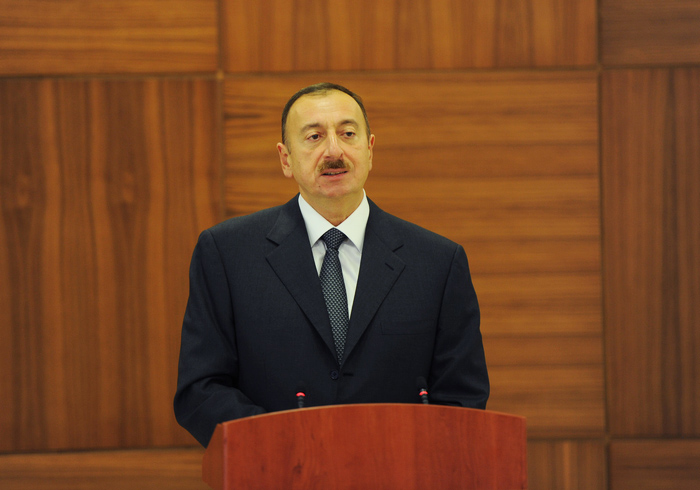Baku, Azerbaijan, April 28
By Seymur Aliyev - Trend:
No country in the world recognizes illegal Nagorno Karabakh, said Azerbaijani President Ilham Aliyev, speaking at the opening of the 3rd Baku Global Shared Societies Forum in Azerbaijani capital on April 28.
The president reminded that almost 20 percent of the Azerbaijani territory is occupied by Armenia, and as a result of the conflict more than one million of Azerbaijanis became IPDs and refugees on their own land.
"We suffered from ethnic cleansing, from Khodjaly genocide, which is recognized already by more than 10 countries, and this process continues, we're suffering from brutal violation of international law," the president said.
The president said that when Azerbaijan was elected to the UN Security Council, which is the leading international body of the world, the country made it very clear that we will defend justice and international law.
"Unfortunately, international law is no longer something that all the countries respect," he said. "But this is the reality."
He said that it seems sometimes that the international law is obligatory only to countries, which are not strong enough to achieve their goals by different means.
"The world's leading countries sometimes brutally violate international law norms, and this actually undermines the whole construction of the post-war international relations system," Ilham Aliyev said. "This is one of the issues that we need to address very openly, clearly, and to try to use our opportunities, intellectual potential, and the influence in the world, in order to strengthen the system of international relation which exists, and we need to respect the resolutions of international organizations."
He said that in some cases the resolutions are being implemented immediately, in other cases they're not implemented for years or decades.
"This comes in contradiction with international law, political interests, political priorities," he said. "This leads to frustration, leads to situations when double standards become a rule, not an exception. We, as a country, know how painful it is, as we're suffering from double standards, brutal violation of international law."
"The occupation of internationally recognized and historic territories of Azerbaijan by Armenia continues for many years, regardless the four UN Security Council Resolutions, which require immediate and unconditional withdrawal of Armenian troops from Azerbaijani territories," he said.
The president said Nagorno Karabakh is a historic, integral part of Azerbaijan, and no country in the world recognizes the illegal Nagorno Karabakh as an independent entity.
"Territorial integrity is a fundamental principle of international law," Ilham Aliyev said. "It is written in the UN Charter, it is one of the most important elements of international law, as it is defined in the Helsinki Final Act. And there should be no contradiction, and very clear understanding that the right for self-determination should not violate the territorial integrity of the countries."
President Aliyev said that territorial integrity of any country cannot be changed without an agreement of the government and people of that country.
"Territorial integrity of Azerbaijan has the same value as territorial integrity of any other country," he said. "Unfortunately, we see in many parts of the world that aggressive separatism attempts to implement the policy of cessation, and violation of territorial integrity lead to conflicts."
"If the Nagorno Karabakh conflict would've been resolved, today probably we wouldn't be seeing other conflicts," he said.
President Aliyev added that Azerbaijan is strongly committed to resolution of this conflict, based on the international law norms and the UN Security Council resolutions.
"This is the biggest problem of our country, the biggest impediment for our development," he said.
The conflict between the two South Caucasus countries began in 1988 when Armenia made territorial claims against Azerbaijan. As a result of the ensuing war, in 1992 Armenian armed forces occupied 20 percent of Azerbaijan, including the Nagorno-Karabakh region and seven surrounding districts.
The two countries signed a ceasefire agreement in 1994. The co-chairs of the OSCE Minsk Group, Russia, France and the US are currently holding peace negotiations.
Armenia has not yet implemented the UN Security Council's four resolutions on the liberation of the Nagorno-Karabakh and the surrounding regions.
Ilham Aliyev: No country recognizes illegal Nagorno Karabakh as independent entity
No country in the world recognizes illegal Nagorno Karabakh, said Azerbaijani President Ilham Aliyev






